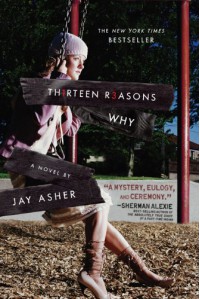Thirteen Reasons Why, by Jay Asher

I've had this book forever but was prompted to finally read it by the series adaptation that just came to Netflix.
(Spoiler-free until the note.)
The most impressive element of this book is the fact that it takes on toxic masculinity and rape culture head on. It's the sort of book that I'm not sure would have existed when I was going through high school. That alone makes it a relevant, disturbing, but necessary read for students (and teachers, counselors).
The story is divided between protagonist Clay's perspective and Hannah's, the girl at the center of the narrative who committed suicide. One day Clay finds a package containing seven cassette tapes, which he must pass on to the next person spoken about on the tapes (one side per person). Each person had a role in Hannah's downward spiral, so the book is set up as a mystery. What happened to Hannah? Why did she kill herself?
Each chapter takes on one tape, and as he listens, Clay follows the map Hannah made and slipped in his locker before she died that marks key spots in her story. It was sometimes difficult for me to engage with this structure; someone wandering around listening to audio tapes isn't all that dynamic. I liked the idea of the book's structure but not necessarily its execution.
(SPOILERS) I'm also disappointed in the revelation of Clay's role once he reaches his own tape. I understand the choice to keep Clay a "good guy" in the reader's eyes since his is the point of view we're following, but I think the story would be more impactful if there was something he did or didn't do that forced him to reevaluate his own actions or inaction. He does regret leaving Hannah alone, but it's when she asks him to, which felt a bit problematic because generally when a girl tells you to leave, YOU SHOULD LEAVE, so technically Clay did the right thing. He blames himself for not helping her, for not persisting, but it feels like he's making Hannah's pain about him.
Clay also feels guilty and angry at himself for not standing up to others when it comes to how girls are treated, and by the end, in the last scene, we're to understand that will change (in contrast to another person on the tapes he runs into earlier, who still seems incapable of understanding his role--or won't acknowledge it). Though there are girls among the thirteen reasons, there's a way in which their roles enact rape culture and patriarchy (not that this makes them beyond blame). At the same time, the potential saviors the narrative suggests could have made the difference are boys/men, which both fairly places the responsibility on their shoulders--but also suggests the old man-as-rescuer trope. (END SPOILERS)
Regardless of my concerns, I'm grateful there's a book like this out there, tackling these subjects, and I'm interested in how the show on Netflix adapts its particular structure.










